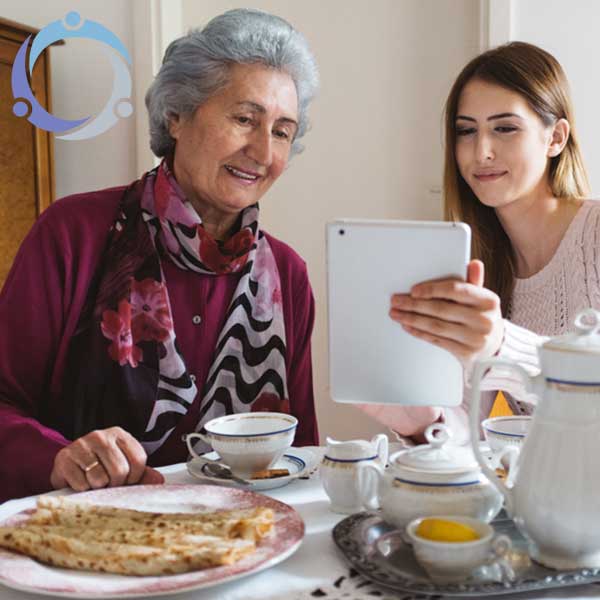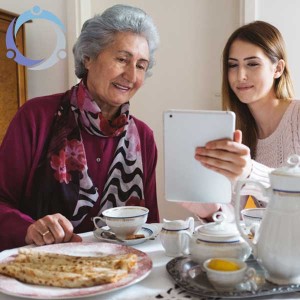
Caregiving is the age-old tradition of providing care for loved ones with chronic conditions, disabilities, disease, or the frailties of old age. It is an act of compassion, love and loyalty. It requires immense sacrifices, but it can also yield great rewards. As a caregiver, you help to fulfill the physical, emotional, psychological and social needs of the loved one you are tending to.
As a caregiver for a loved one, you may experience a wide range of emotions. You may feel shocked that your life has taken such a dramatic turn. You may feel grief as you mourn the loss of the way things were and experience anxiety as you try to adjust to the new dynamic of your relationship. During good days, you will experience pure devotion, quiet intimacy, unending patience, wholehearted gratitude, and a strong sense of purpose. During bad days, you may feel stressed and overwhelmed as you are pulled in different directions. You may feel resentment about carrying such a large burden of responsibility while also experiencing a newfound intimacy with the one you love.
Navigating the world of family caregiving and all the responsibilities and emotions that come along with it isn’t easy. This guide serves to steer you through the process and ensure that you get the help you need. You will learn why it is so important to self-identify as a caregiver in order to open yourself up to the resources available to you. You will explore the challenges of caregiving and its effects on your relationships and your health. You will learn how to ask for and accept help from a community of supporters. Finally, you will have the opportunity to explore more resources to guide you through the caregiving journey.
What is a Caregiver?
 The term “caregiver” is an unusual one. Is a mother a caregiver? Are pet-owners caregivers? What about a first grade teacher? The best way to answer the question, “what is a caregiver?” is the technical definition. A “caregiver” is family member, partner, friend or neighbor who provides care for someone who needs help with daily activities due to chronic illnesses or conditions. According to the Family Caregiver Alliance, “About 44 million Americans provide 37 billion hours of unpaid, ‘informal’ care each year for adult family members and friends.” This means the majority of people will become a caregiver or know someone who is a caregiver at some point in their lives.
The term “caregiver” is an unusual one. Is a mother a caregiver? Are pet-owners caregivers? What about a first grade teacher? The best way to answer the question, “what is a caregiver?” is the technical definition. A “caregiver” is family member, partner, friend or neighbor who provides care for someone who needs help with daily activities due to chronic illnesses or conditions. According to the Family Caregiver Alliance, “About 44 million Americans provide 37 billion hours of unpaid, ‘informal’ care each year for adult family members and friends.” This means the majority of people will become a caregiver or know someone who is a caregiver at some point in their lives.
A family caregiver is often the person responsible for daily routines like helping to feed, bathe and dress the loved one they are caring for. They may also be responsible for scheduling appointments, providing transportation, buying groceries and toiletries, keeping the home clean, and sorting out insurance paperwork, legal documents and financial matters. Caregivers who assist loved ones are not only a huge source of help with daily activities, but they can also serve as an amazing source of emotional support because of the inherently intimate relationship.
Am I a Caregiver?
With such a lengthy list of responsibilities, it may be surprising to learn that family caregivers often fail to identify themselves as such. Even though they may spend hours upon hours taking care of someone’s material, physical and emotional needs, they still think of themselves as a spouse, a friend or a family member who is simply helping a loved one in need.
If you fall into this category, it’s important to start self-identifying as a caregiver so you can open yourself up to the countless resources available to make your job easier. There are home health aides who have professional training in caring for elderly and ill patients. There are monetary resources available through government programs that can ease the financial burden that comes along with caregiving. Most importantly, there are communities of people who have been through similar experiences and are now stronger because of them.
I am a Caregiver and I am Not Alone
Caregiving may feel like a full time job and it often comes on without warning. Imagine if your boss suddenly asked you to take on an additional 20 hours of work each week. You would likely think he or she was crazy and politely decline the offer. Yet with caregiving, that is essentially the situation that you find yourself in. When you look at the circumstances in this new light, it may be easier to realize that you shouldn’t be expected to shoulder the responsibility all on your own.
When self-identifying as a caregiver, you are acknowledging:
- You spend a significant amount of time and resources to care for someone in your life.
- You play a vitally important role in someone else’s life, and it is not a responsibility that you can or should shoulder alone.
- You can rely on friends and family to help you care for your loved one.
- You need to allot time to care for yourself as well.
Caregiver Community
A Pew Research Center Poll found that about 40 percent of American adults act as caregivers for a loved one. These people can share invaluable wisdom learned through first-hand experiences. Knowing that others are undergoing the same struggles can also help provide you with the encouragement you need to persevere. You have a powerful community behind you, you simply need to learn how to leverage it.
Community building is a crucial step towards reducing the stress that caregivers experience. Your community can include your family, friends, colleagues and neighbors, as well as the family, friends colleagues and neighbors of the person you are caring for. You can also lean on others in your area who understand the challenges you are facing because they have faced them themselves. By maintaining peer support, family relationships, social connections and professional contacts, you will be armed with a powerful community who can help you through your caregiving journey.
A strong community of support is they key to overcoming the challenges of caregiving. It can reduce your feelings of isolation, provide you with trusted people to talk to, lend assistance with daily needs, and provide you with much-needed respite from your caregiving responsibilities. By understanding the challenges of caregiving and working to overcome them, you will ensure a happier and healthier life for yourself and your loved one.
Overcoming The Challenges of Caregiving
 Caregiving comes with a whole set of challenges. It creates a dramatic shift in your relationship with the person you are caring for. It can also disrupt the family dynamics when multiple people are responsible for a family member’s care. In order to keep providing the best care for your loved one, it’s important to leave any emotional baggage at the door and communicate clearly and honestly with everyone involved in the caregiving process.
Caregiving comes with a whole set of challenges. It creates a dramatic shift in your relationship with the person you are caring for. It can also disrupt the family dynamics when multiple people are responsible for a family member’s care. In order to keep providing the best care for your loved one, it’s important to leave any emotional baggage at the door and communicate clearly and honestly with everyone involved in the caregiving process.
For instance, if you are a family caregiver tending to a parent, if can be an uncomfortable process as you work to sort out your new roles. The person who once cared for you now relies on you for care, and as a result they may experience feelings of shame, stubbornness or guilt. However, with plenty of communication and an open dialogue, you and your parent can come to terms with your new roles and begin enjoying the time that you have to spend together. Let your parent know that you are dedicated to their care and that they are never a burden to you. Make it clear that you are helping them because you love and care for them, not because you feel it’s an obligation or a duty.
Another challenge as a family caregiver is that you will find yourself navigating unfamiliar territory with the rest of your relatives. For instance, when caring for elderly or sick parents, siblings often have differing opinions on what the best course of treatment should be, what the appropriate living situation is, and where the money should come from to pay for it all. Further, if there is an unequal division of caregiving duties among siblings it may lead to frustration and resentment. One party may feel overburdened while the other feels left out.
Get on the Same Page
Overcoming these challenges as a family caregiver includes an extra effort to communicate early and often if anybody has concerns. Here are 3 key things you need to do when coordinating help as a family caregiver:
- Make a point to take everyone’s advice into account when making decisions and collaborate to find meaningful compromises.
- Don’t box your siblings into the roles that you have associated with them since childhood. Instead, look to each family member’s strengths when managing the care for your loved one.
- Keep all members of the family on the same page.
Relaying the same story at the same time is of the utmost important as a family caregiver. Near or far, you can literally keep your family on the same page with Lotsa Helping Hands. The “Announcements” section allows you to disperse information to everyone in your community at one time while the “Care Calendar” serves to help organize caregiving tasks as well as update everyone on what form of help is needed. Creating a community on the site will give everyone ample opportunity to lend a hand while also keeping everyone up-to-date on important information regarding their loved one’s care.
Stay Positive
If you are a caregiver for a friend or spouse, it can be hard to adjust to the new dynamic of your relationship. However, it is much easier to take on your new role energetically and whole-heartedly when you realize that you are the person who can provide the best and most loving care, because you have so much invested in your loved one already. While your caregiving experience can be hard, it can also provide you with a closeness and intimacy that you may never have expected in your relationship. Regardless of what life throws at you, there is always something to be grateful for. Here are a few easy tips to stay positive while caregiving:
- Set aside special time. Make sure you have a set time everyday where you talk about something besides daily tasks. Read the same book or watch a movie together so you can discuss it.
- Remember the good times. Find a picture of one of your favorite moments with your loved one to keep in your wallet or use it as the wallpaper of your smart phone.
- Seek out inspiration. Create a Pinterest Board of inspirational quotes and share it with your loved one. You’ll both be notified when the other one adds something new to the board.
Following these tips will help ensure that you are making a conscious effort to stay positive and upbeat. Encourage your partner to do the same, and lead by example. You may not be able to change the situation you are in, but you can definitely control how your respond to it.
Know The Risks
The challenges of caregiving and the emotions that are wrapped up in them are unique to each relationship. However, one feeling caregivers seem to be able to relate to is that there simply aren’t enough hours in any given day. Between doctor visits, shopping trips, managing symptoms and researching treatments there is barely enough time to care for someone else, let alone care for yourself. All too quickly, your responsibilities outside of caregiving seem to fall by the wayside.
When you combine the stresses of daily life with the emotional and physical toll that caregiving has on an individual, it’s inevitable that many people experience a moment when it all becomes too much to handle. That is why it is so important to create a community of support around you. If you don’t rely on others to help you through the caregiving journey, then you risk experiencing caregiver burnout.
Caregiver Burnout
 WebMD describes caregiver burnout as a situation marked by extreme fatigue, stress, anxiety, and sometimes depression. It is the result of a caregiver not getting the help they need and doing more than they are able to physically, emotionally and financially. It’s important to find ways to lessen the daily stress that comes along with caregiving in order to prevent caregiver burnout. If you forget to tend to your personal needs, stress will compound and you will risk suffering the effects of caregiver burnout. The symptoms of caregiver burnout include a loss of interest in activities you previously enjoyed, withdrawal from friends and family, emotional and physical exhaustion, and feelings of hopelessness and helplessness. You may also notice physical symptoms that include a change in appetite and weight, a change in sleep patterns and a weakened immune system.
WebMD describes caregiver burnout as a situation marked by extreme fatigue, stress, anxiety, and sometimes depression. It is the result of a caregiver not getting the help they need and doing more than they are able to physically, emotionally and financially. It’s important to find ways to lessen the daily stress that comes along with caregiving in order to prevent caregiver burnout. If you forget to tend to your personal needs, stress will compound and you will risk suffering the effects of caregiver burnout. The symptoms of caregiver burnout include a loss of interest in activities you previously enjoyed, withdrawal from friends and family, emotional and physical exhaustion, and feelings of hopelessness and helplessness. You may also notice physical symptoms that include a change in appetite and weight, a change in sleep patterns and a weakened immune system.
One of the biggest factors leading to caregiver burnout is setting unrealistic expectations for your role in someone’s recovery or care. It is extremely frustrating when it feels like you are doing everything in your power to care for someone, yet their health still doesn’t improve. It is discouraging to watch someone’s condition deteriorate even though you are spending all of your time and resources on their care and doing all the right things. This is a particularly hard situation for those who are caring for people with progressive diseases. The lack of control in managing a loved one’s illness is a big component of caregiver stress.
Don’t Let Stress Lead to Burnout
There is no doubt that caregiving can be stressful, but finding ways to manage the stress before it overwhelms you and leads to the adoption of poor health habits is the key to avoiding burnout. According to a study published in The Gerontologist, people who are the primary caregiver for a loved one tend to put their own health on the back burner as they focus all of their energies on caring for someone else. Caregivers will often skip or miss doctor appointments, physicals and flu shots. They may also adopt a poor diet or lack of physical activity due to the stress on their time and their emotions.
It is clear that caregiver stress, and the burnout it can lead to if it isn’t properly managed, is detrimental to your health. However, it’s important to note that it’s also detrimental to the health of the person you are caring for. You cannot effectively take care of someone else if you aren’t taking care of yourself first. Think about the flight instructions you hear every time you board an airplane: “In the event of an emergency, oxygen masks will drop down. Put on your own mask first and then help those around you.” The same principle applies to caregiving. You are of no use to others if you can’t breathe yourself, both literally and figuratively. If you find yourself drowning in an overwhelming sea of responsibilities and deadlines, you need to step back and take the time to just breathe, or else you risk the very serious consequences of burnout.
Tips to Prevent Caregiver Stress
- Reserve time for yourself. Put respite time on your to-do list and calendar.
- Take care of yourself by getting enough sleep, going to the doctor, and maintaining a healthy lifestyle.
- Don’t be afraid to ask for help.
- Continually build a community of friends, family members, neighbors, and colleagues to assist with items on your to-do list, and make it a team effort.
- Stay organized and keep everyone involved in the caregiving process with the tools at Lotsa Helping Hands.
- Talk with a trusted friend or professional about how you are coping or join a support group.
- Know your limits.
- Resist setting unrealistic goals for recovery.
- Stay positive and remember to count your blessings.
Caregiver stress can lead to burnout, a very real problem that can have serious consequences. That is why it is so important to enlist the help of others in the caregiving process. If you are hesitant to seek help, just remember that self-care leads to better caregiving, and a huge part of self-care is respite. One of the easiest ways to combat burnout is to share the burden of responsibility. If you assume that you can and should handle all aspects of caregiving, then you are placing an unreasonable and unrealistic weight upon your shoulders. Caregiving is an obligation that is simply too large to shoulder alone. Emotional support from friends and family will be of the utmost importance in order to lessen the pressure of caring for a loved one.
Caregiver Support
 It can be challenging to find the courage to ask for and accept help. It can be daunting trying to keep your caregiving tasks organized. It can be confusing searching for resources that you are eligible to take advantage of. Let this guide be a tool to help you build a community of caregiver support and find the help that you need.
It can be challenging to find the courage to ask for and accept help. It can be daunting trying to keep your caregiving tasks organized. It can be confusing searching for resources that you are eligible to take advantage of. Let this guide be a tool to help you build a community of caregiver support and find the help that you need.
Ask For Help
The first step towards easing the burden of caregiving is getting comfortable asking for and accepting help. When somebody falls ill, they often have a strong network of family, friends, co-workers and acquaintances who are eager to lend a hand in whatever way they can. When somebody has a sudden injury or illness, it is common for their network of friends and family to quickly rally around them and show an outpouring of support. Take advantage of this and graciously accept their help.
Be comfortable asking people for specific things that you need help with and you will be surprised by how eager people will be to chip in and help. Unfortunately, it is a common occurrence for this show of caregiver support to gradually decline over time. Don’t take this as a sign that people no longer care to help, because in truth they likely aren’t sure how to continue being useful. Many times people truly want to help but they don’t, simply because they are unsure of what to do. By providing guidance and assigning tasks, you can cut down your to-do list and build a strong community of support.
Assign Tasks
The easiest way to enlist help that will benefit both you and your loved one is to create a list of all your caregiving needs. Take the time to be as specific as possible and be realistic about which tasks you can handle yourself. Then recruit help for everything else. Create a care calendar that lists every task that needs to be taken care of and when and share it with everyone involved in the caregiving process. This care calendar will be instrumental in getting everyone involved from the outset, which in turn will make them more invested in the outcomes.
Some of the caregiving tasks will stay with you, such as bathing and dressing your loved one. However, many of the other tasks, such as running errands, preparing meals and offering rides can be shared among volunteers. By letting others help take care of the necessities of day-to-day life, you will have more time to devote to your caregiving duties. Everyone’s caregiving list will be unique based on their situation, but you can use the following checklist to get you started:
Caregiving Task List
- Rides to doctor appointments
- Rides to social or religious activities
- Prescription pick-ups
- Assistance with exercises and physical therapy
- Grocery shopping
- Meal preparation
- Laundry
- Household cleaning
- Household maintenance and upkeep
- Accident-proofing the home
- Keeping distant family members up-to-speed
- Visiting Hours
It is also important to stay organized when dealing with the administrative side of caregiving. A smart organizational system will save you time and energy when managing caregiving tasks. It will also provide you with a feeling of control in an otherwise turbulent process. Getting this information organized early into your caregiving role will give you an emotional advantage that can greatly reduce your stress. Use the following checklist of materials to ensure you have everything in order then find an organizational system that works for you:
Caregiving Materials List
- Birth certificate, social security card, citizenship papers, etc.
- Medical history
- List of medications and drug interactions
- Schedule of medication dosages
- Schedule of doctor appointments
- List of questions for doctors, nurses, hired help, etc.
- Telephone numbers for doctors, hired help, urgent care facilities, etc.
- Contact information for family and friends
- Health Insurance policies and forms
- Will
- Power of Attorney documents, if applicable
- Any pre-arrangements for cemetery plots, funeral, obituary, or wishes regarding burial/cremation
- Estate planning and trust documents
- Insurance policies for home, auto, disability insurance, life insurance, etc.
- Financial information including bank accounts, assets, property deeds, safety deposit boxes, etc.
- Veteran’s discharge papers, if applicable
- Pension, retirement and social security benefits
Caregiving Resources
 Lotsa Helping Hands is the perfect place to begin building your community of caregiver support. You can connect with your community in the comfort of your home or on-the-go with the mobile app. You can keep your friends and family connected in a simple and efficient way. It is a one-stop shop for organizing your loved one’s care while ensuring that you get the support and respite you need. The caregiving resources available at the Lotsa Helping Hands website will help you feel confident that you are doing the best you can for your loved one. Furthermore, the Lotsa Helping Hands blog provides relevant information on the topics that matter to you most.
Lotsa Helping Hands is the perfect place to begin building your community of caregiver support. You can connect with your community in the comfort of your home or on-the-go with the mobile app. You can keep your friends and family connected in a simple and efficient way. It is a one-stop shop for organizing your loved one’s care while ensuring that you get the support and respite you need. The caregiving resources available at the Lotsa Helping Hands website will help you feel confident that you are doing the best you can for your loved one. Furthermore, the Lotsa Helping Hands blog provides relevant information on the topics that matter to you most.
We are also proud to collaborate with partner sites which provide dependable health information and amazing caregiving resources. We partner with over 50 of the nation’s leading nonprofit organizations to ensure that you have all the information you need when you need it – it’s all just a click away by following the links below.
The information in this guide is a tool to help you serve as an empowered caregiver. You know what a caregiver is, how to self-identify as one, and how to handle the challenges of caregiving and avoid burnout by relying on a community of support. These additional resources listed below can help you care for your loved one while also restoring health and balance to your own life. Remember that there is a powerful community of support behind you and you do not have to bear the responsibilities of caregiving alone.
Partner Sites
Caregiving
- ARCH National Respite Network
- Caring Connections
- Family Caregiver Alliance
- Heroes for Children
- National Organization for Empowering Caregivers
- National Alliance for Caregiving
- Project Compassion
- RCI: Rosalynn Carter Institute for Caregiving
- Well Spouse Association
Patient Advocacy
ALS
Alzheimer’s
Bone Marrow Failure
Brain Tumors
Cancer
- CancerCare
- Colon Cancer Alliance
- Kidney Cancer Association
- Leukemia & Lymphoma Society
- Stephanie Robinson Foundation (Leukemia & Lymphoma)
- Living Beyond Breast Cancer
- YSC: Young Survival Coalition (Breast Cancer)
- American Lung Association
- The Lung Association, Alberta & NWT
- National Coalition for Cancer Survivorship
- National Ovarian Cancer Coalition
- People Beating Cancer
- ThyCa: Thyroid Cancer Survivor’s Association, Inc.
Crohn’s and Colitis
Eye Disease
Kidney Disease
Multiple Sclerosis
Muscle Disease
Stroke

